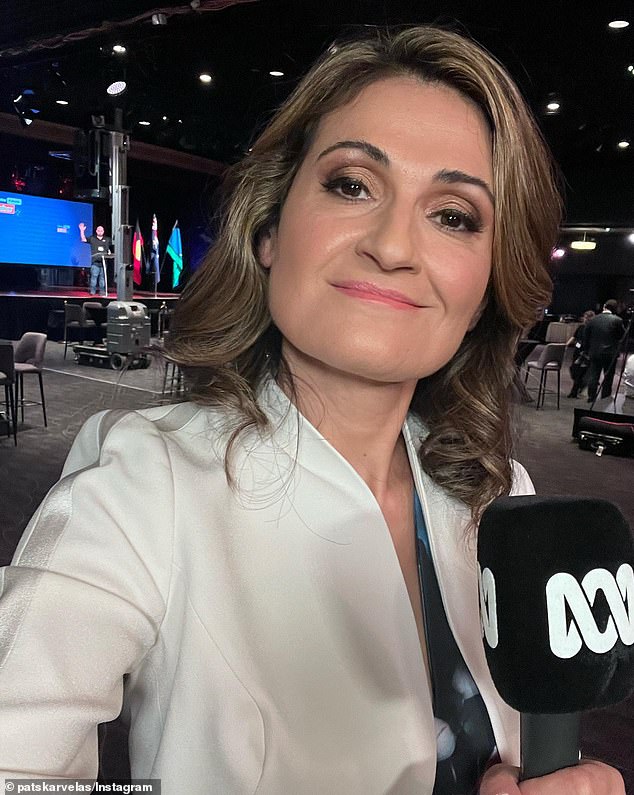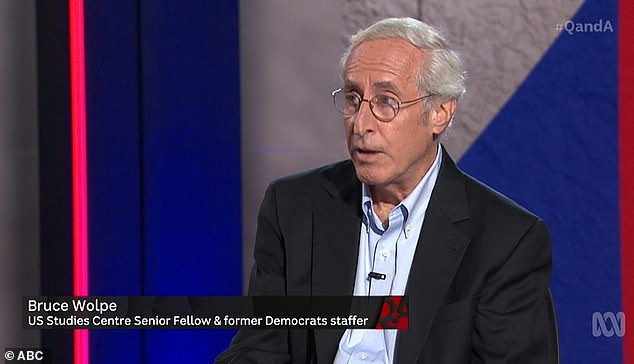Don’t believe the catastrophising ABC – here’s why Trump’s ‘America first’ strategy will be a triumph for Australia, writes STEPHEN JOHNSON
Left-wing commentators were already foaming at the mouth over Donald Trump’s “America first” trade policies before his opponent had even conceded defeat.
Patricia Karvelas, presenter of the taxpayer-funded ABC Radio National breakfast show, suggested his plan for tariffs of 10 to 20 percent would destroy the prospects of Australian exporters.
“Given that the US is Australia’s third largest trading partner, these could directly affect local industries,” she stated.
“Tariffs will become an important part of Trump’s trade agenda.”
This was Thursday morning, Australian time, and Democratic Vice President Kamala Harris was an hour away from conceding defeat, having lost the industrial states of Pennsylvania, Michigan and Wisconsin to Trump’s Republican Party.
The ABC orgy of catastrophizing over a possible Trump victory was in full force on Monday night, as the panel of August experts struggled to grasp the prospect of Democrats once again losing their working-class heartland.
Bruce Wolpe, an adviser to former Labor Prime Minister Julia Gillard who worked for US Democrats in Congress, suggested a Trump administration would be reluctant to grant exemptions for Australia.
“On the bilateral issues, on the trade front, whether Australia gets a waiver will be an early test for tariffs,” the US Studies Center senior fellow said.
But these ABC talking heads downplayed a few facts.
Left-wing commentators were already foaming at the mouth over Donald Trump’s ‘America first’ trade policy even before his opponent had conceded defeat
Including the fact that the first Trump administration gave Australia an advantage in 2018 exemption by 25 percent import duties on steel and 10 percent import taxes on aluminum.
They also failed to mention that the newly elected president is primarily concerned about America’s trading partners selling them more goods and services than they buy.
In other words, he hates trade deficits where other countries dump cheap goods on American consumers and threaten their local jobs.
After winning back the Midwestern states that backed Joe Biden in 2020, Trump has a mandate to punish states that exploit their access to the world’s largest consumer market.
But in the case of Australia, the Americans have a trade surplus with us. So Australia isn’t dumping cheap goods into the US
That should put Australia in the Trump administration’s good books – and give us a special advantage.
In 2023, Australia imported $65.1 billion worth of goods and services from the United States.
This happened when Australia exported $33.6 billion worth of products to the US

Patricia Karvelas, presenter of taxpayer-funded ABC Radio National breakfast show, suggested Trump’s plan for tariffs of 10 to 20 percent would destroy the prospects of Australian exporters.
So the fact that Australia buys almost twice as many US goods and services as it exports to the US means there is a good chance that a second Trump administration will grant us tariff exemptions again.
And it’s not just me saying it.
Alexander Downer, Australia’s longest-serving foreign minister, also made this point in a column for The Australian.
“Tariffs will be imposed unless countries agree to liberalize their markets for U.S. exporters,” he said.
“They say commentators misunderstand Trump’s approach to tariffs. They should be seen as an ambition claim.’
What also works in Australia’s favor is the fact that we have had a free trade agreement with the US since 2005.
This eliminated tariffs on 99 percent of American goods and services exported to Australia, and made it easier for Americans to export processed foods, fruits and vegetables, corn and soybeans to Australia.
Trump will certainly not be the first American president to impose punitive tariffs on countries that want to flood the American market with cheap goods.
Ronald Reagan, a former Republican occupant of the White House, imposed 100 percent tariffs on Japanese electronic goods and 45 percent tariffs on Japanese motorcycles as a favor to Harley-Davidson.
The California actor had more punitive tariffs than Trump even proposed, and he was hailed as a champion of free trade in the 1980s.

Bruce Wolpe, an adviser to former Labor Prime Minister Julia Gillard who worked for Democrats in Congress, suggested a Trump administration would be reluctant to grant exemptions for Australia.
In both cases, the Japanese were making goods that competed directly with American manufacturers, and the Reagan administration just wanted a fairer deal for American companies that wanted to export their goods to the Japanese market.
Australia has not exported Holden Commodores and Monaros to the US since 2009.
They were sold as Chevrolet SS and Pontiac G8 sedans and Pontiac GTO coupes for the US market.
Since Australian car production ceased in 2017, Australia poses no threat to American car markings anyway. But we do export aluminum and steel to the United States.
Imposing tariffs on other countries that dump their goods on Americans means Australia would have less competition when selling their goods to the world’s largest economy.
The United States was Australia’s third largest trading partner in 2023, behind China and Japan.
China, Australia’s largest trading partner since 2007, has form when it comes to tariffs, imposing arbitrary 200 percent import taxes on Australian wine, along with a range of trade sanctions on barley, timber, lobsters, coal and more.
That had absolutely nothing to do with protecting Chinese jobs or industry, but was instead a blatant political tactic by communist dictator Xi Jinping to punishing former Prime Minister Scott Morrison in 2020 for daring to call for an investigation into the origins of Covid-19.
The left claims to be champions of the working class – so their outrage at an American presidential candidate who advocates protectionism to give workers a future is mind-boggling.
Almost as baffling as their ignorance of the unique trading relationship between Australia and America, which will most likely save us from tariffs.
